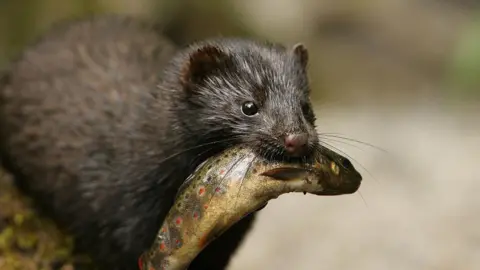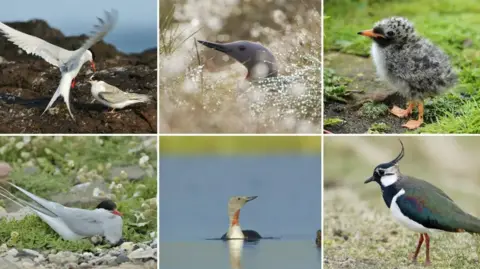New plan to 'eradicate' mink from Outer Hebrides
 JOHN MACAVOY
JOHN MACAVOYWildlife experts hope to "completely eradicate" a species of invasive mink from the Outer Hebrides after receiving new funding to trap the remaining animals.
More than 2,000 American mink have been captured since a project to eliminate them from the islands began in 2001.
Saving Nature Outer Hebrides said a "total removal" of the carnivorous mammals was possible after receiving a £94,000 grant from the Scottish government's Nature Restoration Fund.
The animals were first brought to Scotland for the fur farming industry in the 1950s, but they became feral after the farms closed and began threatening native birds.
Breeding populations of mink became established on North Uist and Benbecula in 1999.
Nature Scot said the Hebrides' coastline and freshwater loch meant the population of mink was able to grow to levels rarely reached in its native North America.
Local wildlife threat
The Hebridean Mink Project started capturing the animals in 2001.
This allowed local wildlife species to recover, including terns and gulls and wader species such as oystercatcher, lapwing, curlew, snipe, dunlin and plovers.
It was thought the number of mink had been reduced to a population that was no longer functional in 2018.
But 20 – 30 of the animals have been trapped annually since.
Saving Nature Outer Hebrides said the current programme of trapping "was not enough" but a total eradication of the animals was "feasible".
 NATURE SCOT
NATURE SCOTDavid Maclennan, head of operations for Nature Scot in west Scotland, said: "Thanks to the prolonged efforts of the Hebridean Mink Project, the mink population in the Outer Hebrides has been reduced to extremely low levels with significant positive consequences for ground nesting birds.
"It's clear, however, that the existing level of trapping has not been enough to completely eradicate mink from the islands.
"We believe that while it will be challenging, total removal is feasible and in the long term offers both the most effective protection for our native wildlife and the most cost-effective solution to the problem."
